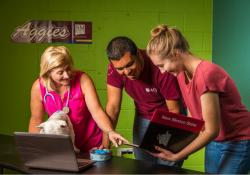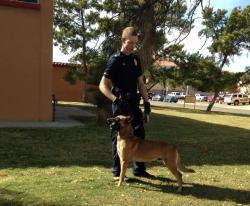Human-Animal Interaction Minor
The Human-Animal Interaction (HAI) courses offered in the Department of Animal and Range Sciences cover the domestication, history, physiology, husbandry, human-animal bond, training and behavior, and health and diseases of the many types of animals that society now views as companions. While the program focuses mostly on the two most popular pets in the U.S. (dogs and cats) other animal species such as birds, rodents, reptiles, and amphibians are studied.

The HAI minor is open to all Undergraduates at NMSU. To receive the minor students must take 18 credit hours in 6 courses: companion animals in society, introduction to companion animal management, companion animals and the human-animal bond, internship, canine and feline behavior and training, and canine and feline health and disease.
When you have registered for, or completed your last class for the minor, print the Human-Animal Interaction STAR degree audit for the minor showing that all requirements have been completed or are in progress, fill in the information, and sign the audit:
-
STAR Audits can be generated at https://degreeaudit.nmsu.edu/
-
For degree be sure to select Human-Animal Interaction Minor in the drop down menu; it might be near the bottom.
Deliver the audit to Dr. Gaylene Fasenko, Knox Hall Room 2something, for certification. The department will forward the certified audit to the appropriate office where they will ensure that the minor appears on your final transcript
Courses
ANSC 112: Companion Animals in Society (3 cr.)
Examination of the history, evolution and future roles of companion animals in human society. The companion animal industry, governmental policies and laws, and sports and competitions involving interactions between companion animals and humans will be explored. Special emphasis will be given to canine and feline species. Restricted to: Main campus only.

ANSC 285: Introduction to Companion Animal Management (3 cr.)
Introduction to care and management of companion animals. Topics will include understanding of common varieties of pets and their place within human cultures, domestication, breeding ethics, nutrition, management, and health care topics. Restricted to: Main campus only.
ANSC 312V: Companion Animals and the Human-Animal Bond (3 cr.)
The science behind the human-animal bond. An examination of the interactions between humans and companion animals and the effects on human health and wellness. Cultural and geographical differences in the human-animal bond will be explored. Topics will include Animal Assisted Activity (AAA), Animal Assisted Therapy (AAT), and service animals. Emerging of future uses of companion animals in human-animal interactions will be discussed. Restricted to: Main campus only.
ANSC 390: Internship (3 cr.)
Professional companion animal work experience under the joint supervision of the employer and faculty member. 3 credits required for minor. Graded S/U. Prerequisites: consent of instructor. Restricted to: Main campus only.
ANSC 411: Canine/Feline Behavior and Training (3 cr.)
An examination of the behavior course of companion animals and the role that genetics, physiology, neurobiology, and domestication have played. Training methods and problem behaviors will be examined. The influence of companion animal owners in shaping their animal’s behavior will be explored. Prerequisites: Junior/Senior status or consent of instructor. Restricted to: Main campus only.

ANSC 412: Canine/Feline Health and Disease (3 cr.)
Examination of the differences between infectious and non-infectious diseases and the basics of the immune system. Pathophysiology and treatment of common disease affecting canines and felines and the role the pet owner plays in pre-disposing their animals to disease. Prerequisite(s): ANSC 285 or consent of instructor. Restricted to: Main campus only.
Careers
Criminal Justice
-
Police Canines
-
Courthouse Dogs
Psychology
- Animal-Assisted Therapy
Facility for Investigating Dog/Owner Learning and Behavior (FIDO LAB)
The FIDO LAB, which is located in the Tejada building, provides students a learning space for the many hands-on opportunities available in the HAI Minor. The FIDO LAB is frequently used by other University and community programs for seminars/workshops/training.
If you would like, please make a donation to the FIDO LAB and the Human-Animal Interaction Minor.